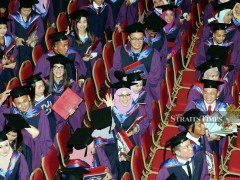News

Bring back education with a 'soul'
Date : 15 September 2020
Reported by : Danial Yusof
Category : News
Tweet This
By Dzulkifli Abdul Razak
UNDER the influence of Covid-19 where things are more fluid and uncertain, good governance becomes even more important to understand and practise. Although more frequently addressed from the corporate sector viewpoint, it is not a one-size-fits-all approach.
Hence, when forced on the education sector, it falls terribly short like trying to fit a square peg in a round hole. It damages and distorts education, including higher education.
Attempts to hijack education subtly in this way by "corporatising" (read: commercialising) it has not met with much success. It explains the bastardised version as it is today — an education without soul.
The concept of governance, according to the International Bureau of Education, a Unesco-based organisation, refers to "structures and processes that are designed to ensure accountability, transparency, responsiveness, rule of law, stability, equity and inclusiveness, empowerment and broad-based participation".
Rule of law is one of many that make up the vistas of education, where governance is more subtle and may not be easily observable. This include the process of decision-making and mechanisms for holding governments accountable, especially in the context of public affairs where education is deemed a public good.
It, therefore, encompasses the various aspects of "how power is distributed and shared, how policies are formulated, priorities set and stakeholders made accountable". Arguably, it is also in tandem with the targets of the Sustainable Development Goals (SDGs, 2016-2030).
Good governance in education is deemed by experts to have failed if there is a decline in institutional integrity and capacity, aggravated by arbitrary actions and compromised by conflict of interests.
Political interference and patronage appointments are among the dominant examples undermining the institutional autonomy and integrity of education institutions worldwide, including in Malaysia. Such actions have increasingly been reported to dominate and distort well-thought-out policies and procedures by weakening the leadership capacity of the institution.
Especially when the processes and decisions are shrouded in 'intelligence' (read: rumours) that is unsubstantiated with no disclosure of the reasons and evidence associated with the said actions. On several occasions this opens wide the window of corruption and self-interest in manipulating the academic sector. Most affected are those at the bottom of the economic pyramid.
In other words, it tolerates the practices of bad governance by turning the education ecosystem into a marketplace to commoditise learning and schooling for the purposes of "improving" the livelihood (economy), at the expense of promoting life and living (sustainability).
To this end, good governance goes beyond the casual understanding where the stakeholders are prioritised over the rest.
This is increasingly apparent today where educational disparities and divides are widening. Traits that are inherently egocentric, selfish, exploitative and discriminatory are being exposed by the Covid-19 pandemic in virtually all sectors.
In this context, Education for Sustainable Development introduced in the early 2000s and the more recent SDGs are the transformative platforms to shape a more sustainable tomorrow through good governance.
Under the Covid-19 lockdowns, positive values of selflessness are manifested across the globe whereby humanity has a chance to undergo self-healing in such a way that nature gradually can self-repair, overturning the long-term impact of human harm and abuse.
The overall target is to move against the negative values and practice so that education begins to align itself in a balanced co-existence with Mother Nature. An education with soul.
The writer, a 'New Straits Times' columnist for more than 20 years, is International Islamic University Malaysia rector
Source: https://www.nst.com.my/opinion...








